This is 65: Musician and Author Amy Rigby Responds to The Oldster Magazine Questionnaire
"Rock and roll helped change the way we age, saying it’s okay to make a spectacle of yourself and still seek an audience even when you’re not the new young thing."
From the time I was 10, I’ve been obsessed with what it means to grow older. I’m curious about what it means to others, of all ages, and so I invite them to take “The Oldster Magazine Questionnaire.”
Here, singer-songwriter, memoirist, and newsletter writer responds. -Sari Botton
A teenage denizen of CBGB who fell in love with country songwriting, Amy Rigby started the bands Last Roundup and The Shams in New York City’s East Village before launching a solo career with 90s classic concept album Diary Of A Mod Housewife. Her new album Hang In There With Me has been called “an absolute masterpiece…a career best” (Louder Than War.) Amy’s been writing online at Diary Of Amy Rigby since before blogs were invented. Her first book Girl To City: A Memoir was published in 2019. She recently relocated to England from New York’s Hudson Valley with her husband and sometime bandmate, Wreckless Eric, and is touring the US and the UK this fall.
--
How old are you?
65
Is there another age you associate with yourself in your mind? If so, what is it? And why, do you think?
I think in my mind I’m still in my early to mid 40s — physically at least. Maybe that was the last time it felt like life was still ahead of me, a feeling I want to hold onto even if it’s not actually true. I still feel like I have the same energy and, thankfully, good health I had at that age. So I bounce around, rock out on stage… Then I’ll remember I’m 65. Parents gone, daughter in her mid-30s. Would I even want to be 40-something again? I was still figuring so many things out.
Do you feel old for your age? Young for your age? Just right? Are you in step with your peers?
I feel young enough for my age. There’s a notice at the supermarket checkout in England for certain purchases — employees must ask for I.D. for someone who is not “visibly over 25” and I admit sometimes I still think, “Wait, don’t you wonder about me?” Ridiculous, I know, but a part of me will always be a kid.
Somebody said our 60s are the youth of our old age, and I like that feeling of starting another phase, and trying to go into it with more perspective and also way more gratitude. The belief that the world owes me something subsided a while ago and that’s a relief. In my 40s I wrote a song called Faulkner’s Maalox inspired by a Maalox prescription bottle I saw in the kitchen when I visited William Faulkner’s house in Mississippi. It woke me up, imagining this great person of letters suffering from heartburn; being human. I wrote the line, “The world don’t owe me nothing, but I owe the world a lot,” in my 40s, trying to convince myself of something it took me another decade or two to believe.
When I go back to Manhattan or London, I want to see my city, the one I lived in when I was young, not the new version that’s left me behind…Having to cede that feeling that I’d always have my finger on the pulse and know what’s happening isn’t easy. But it really does feel like someone else’s job now, to keep up with the latest.
What do you like about being your age?
I’ve had so many experiences: friends, places I’ve lived or visited; films, music, clothing items, books, MEALS. Wonderful and terrible moments I remember and am thankful for in retrospect. Heroes/heroines I’ve met. Loves. Songs written, records made, gigs played; I’ve written reams and reams. It’s like money in the bank. At the same time I’m still going out looking for more of some of those things, but it’s like the pressure’s off. I want to experience many more things, but it’s for sure not so urgent that I do everything.
What is difficult about being your age?
Losing loved ones/friends and important places. The friends— it feels unfair that life just carries on without them in it — it also forces a reckoning: was I a good friend, did they feel valued and supported enough? I try to apply those feelings to the ones who’re still here — have I reached out, just to let someone know how wonderful I think they are?
Places-wise, how outraged I become when beloved institutions — pizza places, stores, whole cities — disappear or change beyond recognition. When I go back to Manhattan or London, I want to see my city, the one I lived in when I was young, not the new version that’s left me behind. It was great when my daughter lived in Brooklyn through the 2010’s. It softened that feeling because I was experiencing the old homestead via her fresh young life and it opened up all the new neighborhoods and new places to me in a way I can no longer get to since she left and moved to L.A. Having to cede that feeling that I’d always have my finger on the pulse and know what’s happening isn’t easy. But it really does feel like someone else’s job now, to keep up with the latest.
What is surprising about being your age, or different from what you expected, based on what you were told?
Even when I was 50 I thought 65 was old. Like, “Ah, if I died then, what’s the big deal? I would have lived a good long life.” Menopause was so hard, I thought life was over in a lot of ways, and that sadness made me wonder what could possibly be good about living another fifteen, twenty, thirty-five years. I didn’t even think about how sad it would be to leave my fully adult daughter at this age, like who will ever know or care about her as much as I do?
And I couldn’t imagine how much I would still feel like creating: writing songs, stories and books; screenprinting; playing guitar, getting up on stage not knowing exactly what’s going to happen. All of those things actually feel more joyful now than they did when I was mostly fueled by hormones, anger and insecurity.
I also think I expected to feel settled at this age. Yet my husband and I just moved continents. When the guy at our new local bank said, “And how long do you plan to stay put now?” we both looked at each like, “Who knows?” Even though moving is harder and harder the older you get, just the sheer physical wear and tear and accumulation and sorting through of stuff and attachments, neither of us ever feel like “This is forever” regarding our whereabouts.
What has aging given you? Taken away from you?
I have more self-confidence — hard-won through continuing to make music, play gigs; write and share my work with whoever’s interested. I sometimes miss the sense of urgency and excitement I had when I wasn’t so seasoned. That belief that anything could happen from one gig, one tour, one new song or album. I quit my day job when my first band Last Roundup’s album came out and we set off on a big tour, thinking “I’ll never need to work again!” — That’s how naive I was. I won’t say I’m jaded but know through experience the results usually seem to come over time in more subtle, unexpected ways.
Even when I was 50 I thought 65 was old. Like, “Ah, if I died then, what’s the big deal? I would have lived a good long life.”…And I couldn’t imagine how much I would still feel like creating: writing songs, stories and books; screenprinting; playing guitar, getting up on stage not knowing exactly what’s going to happen. All of those things actually feel more joyful now than they did when I was mostly fueled by hormones, anger and insecurity.
How has getting older affected your sense of yourself, or your identity?
The roughest years in some ways were my 40s and 50s, where it was dawning on me the only way to honor the struggle of sticking it out as an artist through my 20s and 30s — living an insecure, scrambling scraping by life and subjecting my daughter to that too — was to keep going, and there were some pretty dark times facing that marathon aspect of a lifetime as an artist. Like, things may never get to a higher level, small clubs and house concerts might be my thing, and would I be okay without the dream of “when this happens” or “when this changes”? It’s finally in my 60s that I’m able to say this is it, I made this life in music, all the highs and lows add up to a catalog of songs and records, performances and relationships and it’s pretty wonderful.
Maybe part of the freedom to say, “It’s okay, I’m okay,” comes from my father being gone. (My mother lived fifteen years after her car accident, looked after by my dad.) Watching my dad decline the last couple of years — he’d never understood my life, and I wanted his approval so badly — in the end when it was just being with this guy who in spite of his doubts about my choices in life loved and cared deeply about me, being able to hold his hand and tell him I’m okay, and see this giant of authority reduced to a child, well that freed me so much. Just like finishing my first book felt like it would end me, at times I thought I couldn’t survive watching my father flame out. And then it was over. I miss him, and knowing that guy is walking his mile or two every day and drinking his one cocktail, these two things he loved to do, but I don’t have to fight that battle any more and I feel lighter.
What are some age-related milestones you are looking forward to? Or ones you “missed,” and might try to reach later, off-schedule, according to our culture and its expectations?
In England at the age of 66 you get a bus pass and can ride for free — I love that idea and am looking forward to just hopping on and off buses.
I think I expected to feel settled at this age. Yet my husband and I just moved continents. When the guy at our new local bank said, “And how long do you plan to stay put now?” we both looked at each like, “Who knows?” Even though moving is harder and harder the older you get, just the sheer physical wear and tear and accumulation and sorting through of stuff and attachments, neither of us ever feel like “This is forever” regarding our whereabouts.
What has been your favorite age so far, and why? Would you go back to this age if you could?
I’ll say 60. It was the year I published Girl To City, the memoir it took me ten years of thinking about and another ten years to write and publish. That was the hardest thing I’ve ever done and sometimes I thought it would kill me. I’d started writing a memoir because an agent suggested it to me back in the late 90s when I’d been getting a lot of press for my first two solo albums and I actually thought, “Oh, this’ll be an easier way to make money than music.” Yep, I’m pretty deluded sometimes.
But the whole process of learning to write — not songs, that have flowed out of me easily since I picked up a guitar in the early 80s— but words, that I shared in an online diary that turned into a blog when they invented those, and is now a Substack… trying to put down the truth without the help of chords and melody — that’s been one of my biggest joys in my life, and to see a book through to the end, and bring it out to share with the world felt like my happiest accomplishment. Maybe knowing I was turning 60 helped make it happen.
Is there someone who is older than you, who makes growing older inspiring to you? Who is your aging idol and why?
I guess it would have to be Ian Hunter, the songwriter and musician most people know from 1970s rock band Mott the Hoople. He kept his iconic look, the curls and huge shades and his rock and roll swagger. I played at his 75th birthday and then again at his 80th — we were all trying to get at what he achieved so effortlessly — cool, wisdom, humor, not giving a fuck but caring deeply, too. And he’s never lost that. Still writing great songs, making records. My husband asked him if he’d ever retire and he said, “Nope, keep’s ya perky.” A credo to live by.
The roughest years in some ways were my 40s and 50s, where it was dawning on me the only way to honor the struggle of sticking it out as an artist through my 20s and 30s — living an insecure, scrambling scraping by life and subjecting my daughter to that too — was to keep going, and there were some pretty dark times facing that marathon aspect of a lifetime as an artist.
What aging-related adjustments have you recently made, style-wise, beauty-wise, health-wise?
I’m endlessly struggling with my hair — I can’t bring myself to just let it be the mixture of brown, grey and white it is. Just like my mom I have a money piece, the hunk of white hair over one eye, and sometimes I like it and sometimes it feels too Cruella-ish and I never wanted to have a signature thing — it works for Bonnie Raitt, but that’s Bonnie Raitt. I’m trying to accept it as my thing too. Because I’m a performer I always see photos of myself from gigs and I don’t like the way the not-quite-brown parts look washed out on stage, so I tend to add in lowlights to those. I’m also trying to get used to wearing glasses more but can’t bring myself to play music with them on. I guess I still like to headbang too much for that.
Sometimes it feels ridiculous how long I’ve been raging against getting older. My first album included a manifesto about not being afraid to still wear short skirts with varicose veins and love going to gigs — I was 37! But things have changed a lot since the mid-’90s. I remember a Rolling Stone cover back then asking how Mick, Keith, Neil Young, and Bob Dylan were going to keep going now that they were in their 50s. Remember Tina Turner coming back in her mid-40s, how it felt so bracing and radical? Rock and roll helped change the way we age, saying it’s okay to make a spectacle of yourself and still seek an audience even when you’re not the new young thing.
What’s an aging-related adjustment you refuse to make, and why?
I still like tight, structured clothes and underwire bras. I like hard-soled shoes or boots — I don’t like elastic waists, squishy shoes — comfort feels uncomfortably sloppy to me. I guess I’m afraid of the feeling of letting it all go. Maybe some day I will…
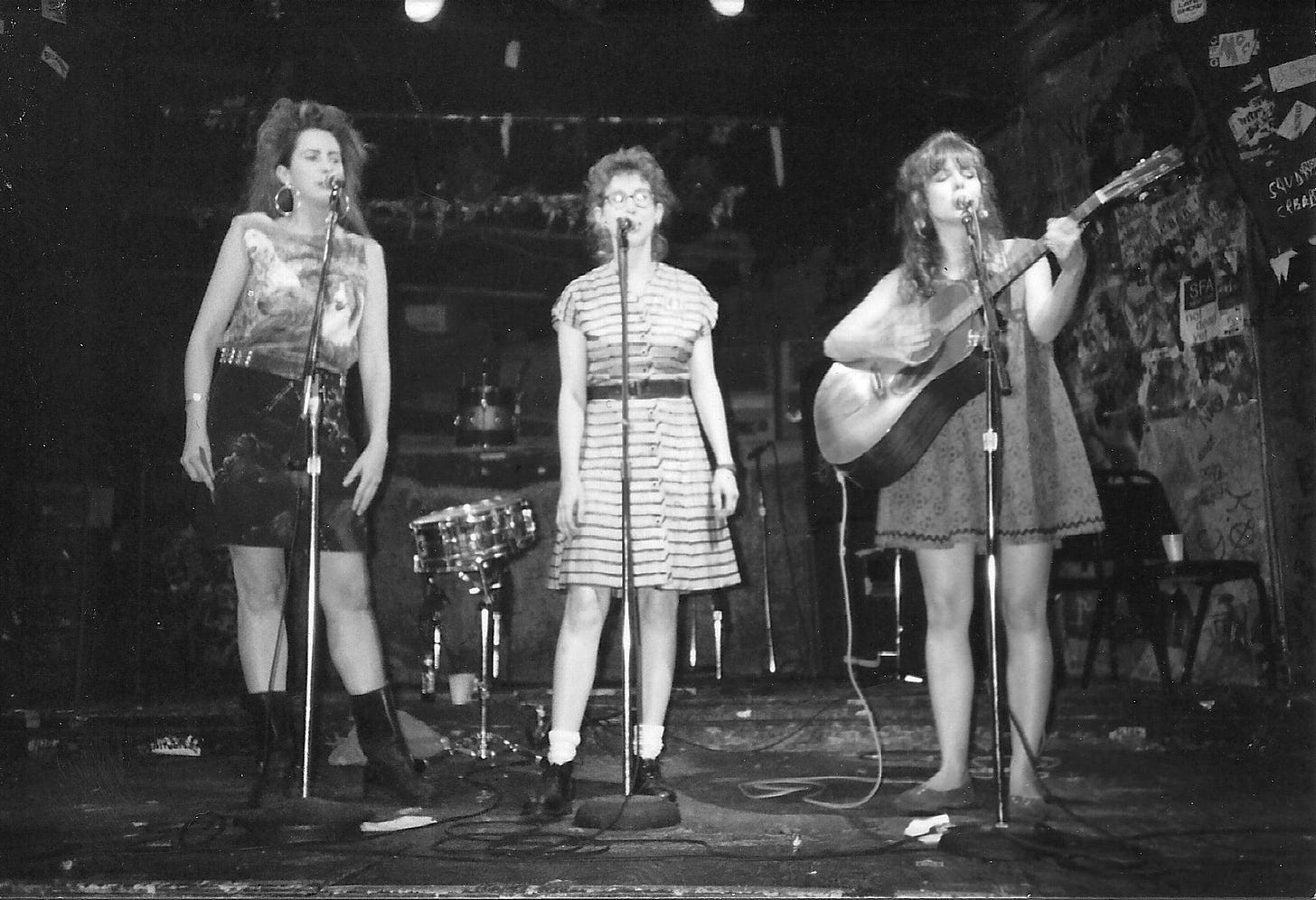
What turn of events had the biggest impact on your life? What took your life in a different direction, for better or worse?
When I was 29, I gave birth to my daughter — my only child, and the whole experience was so happy and made me feel like I could do anything. Two weeks later, my mother was in a car accident that left her severely head-injured. It was the day she was coming to see my baby for the first time. Those two things — the best and worst that ever happened to me — shaped me in ways I’m probably only now realizing. At the time, the impact it had was, I just carried on. I clung to my daughter and my music, and maybe it sort of fused those two things for me. I didn’t know how strong I was back then, only realized it years later.
I also have to say meeting and getting together with my husband Wreckless Eric. He was a hero before we ever met, for his scrappy artistic approach to songs and music. Back in the punk era he stood out for his individualism. I covered one of his songs and that’s how we met, and we gradually got together and he’s been a huge influence on me — his work ethic and creative ethos are so uncompromising. He’s taught me a lot and we’ve had a great time playing music together, talking about records and songs and art; have toured all over and just moved to our third country together (First France, then the U.S. and now England). It’s a continuing adventure and I’m still awestruck by his talent and drive to make music, art, or even just build shelves or hang curtains.
Sometimes it feels ridiculous how long I’ve been raging against getting older. My first album included a manifesto about not being afraid to still wear short skirts with varicose veins and love going to gigs — I was 37! But things have changed a lot since the mid-’90s. I remember a Rolling Stone cover back then asking how Mick, Keith, Neil Young, and Bob Dylan were going to keep going now that they were in their 50s. Remember Tina Turner coming back in her mid-40s, how it felt so bracing and radical?
What is your number one regret in life? If you could do it all over again, what is the biggest thing you’d do differently?
I’d have more confidence in myself. I wrote and recorded dozens and dozens of songs on my four-track when I was in my 20s but mostly felt too shy to get up and sing them by myself. It was great fun being in bands but took me until my mid-30s to put myself out there as an artist. Starting a solo career in music as a working mom of 37 was not easy, but it made for a good story at least.
I guess you could also say I was obsessed with love and sex for most of my teens, 20s, 30s and umm… 40s. It was a huge distraction and I probably spent a lot of time and energy pursuing both of those things, sometimes at the expense of more lasting goals. But it gave me my daughter, my partner Eric, and it’s the same drive that also pushed me to write so many songs. All that madness gave me plenty to write about so…no regrets coyote!
What is high up on your “bucket list?” What do you hope to achieve, attain, or plain enjoy before you die?
I want to make another record as soon as possible and also publish more books (I’m just revising my second memoir, Girl To Country, about moving to Nashville in the beginning of the 21st Century, with a third one to follow, about moving to France) and make more records. I keep touring, booking myself to play small venues; bookstores and house concerts; the occasional bigger show or festival; and I guess I still have dreams of playing to more people at my gigs. I also think I’d like to open a bookstore/bar in England, along the lines of The Spotty Dog Books & Ale, the great place in Hudson, N.Y., where I worked for the last dozen years.
Is there a piece of advice you were given, that you live by? If so, what was it, and who offered it to you?
When Eric and I got together, he told me a piece of advice he’d learned from the great Ian Dury, who’d been his friend in the 70s — he’d played drums in Eric’s band when he was just starting out: “Look after your talent and your talent will look after you.” I used to spend a lot of time fretting about paying bills, finding gigs, how to make ends meet; Why aren’t I where I want to be? When I stop focusing on the “This is hard; life is unfair” part of being an artist and just make more art — write songs, screenprint shirts, play guitar, write another Substack or record another track— it seems to generate more money than sitting worrying and whining ever did.
I guess you could say I was obsessed with love and sex for most of my teens, 20s, 30s and umm… 40s. It was a huge distraction and I probably spent a lot of time and energy pursuing both of those things, sometimes at the expense of more lasting goals. But it gave me my daughter, my partner Eric, and it’s the same drive that also pushed me to write so many songs. All that madness gave me plenty to write about so…no regrets coyote!
What are your plans for your body when you’re done using it? Burial? Cremation? Body Farm? Other? And what do you expect to happen to your “soul” or “spirit” after you die?
Cremation is the way to go for me. I really would have preferred not to see my dad or mother or anyone I love laid out in a funeral parlor. My mother-in-law was cremated and due to the pandemic we never got around to doing anything with her ashes — they’re in a tote bag and we kind of keep them around the house, and will eventually put them in the garden. I like the casualness of that; I still feel close to her that way, and like it’s not some big drastic final step.
I feel lucky to have written and recorded a lot of songs, and as long as whatever format they’re in still exists when I’m gone, I hope I can keep floating around in the atmosphere that way.
Check out “Dylan in Dubuque,” a track from Amy Rigby’s new record, Hang in There with Me:
What’s your philosophy on celebrating birthdays as an adult? How do you celebrate yours?
Having a birthday in late January (in the northeastern U.S. anyway) has always kind of sucked. It’s dark and cold and hibernation time. That said, I always try to do something celebratory, even if it’s just like the first year my husband and I moved to the Hudson Valley and went out to have French onion soup for lunch. We were so broke, it was a treat and felt special. That’s the low bar I’ve kept for birthday celebrations going forward from 2012 — let it be at least as good as that lunch. I realized my bank account was empty later that afternoon, but wow did I enjoy that French onion soup.


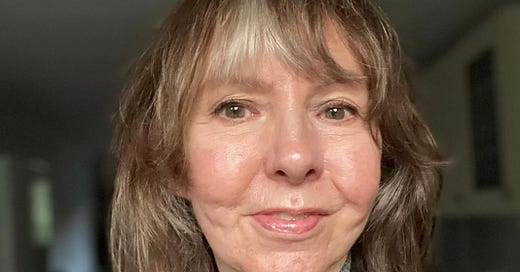



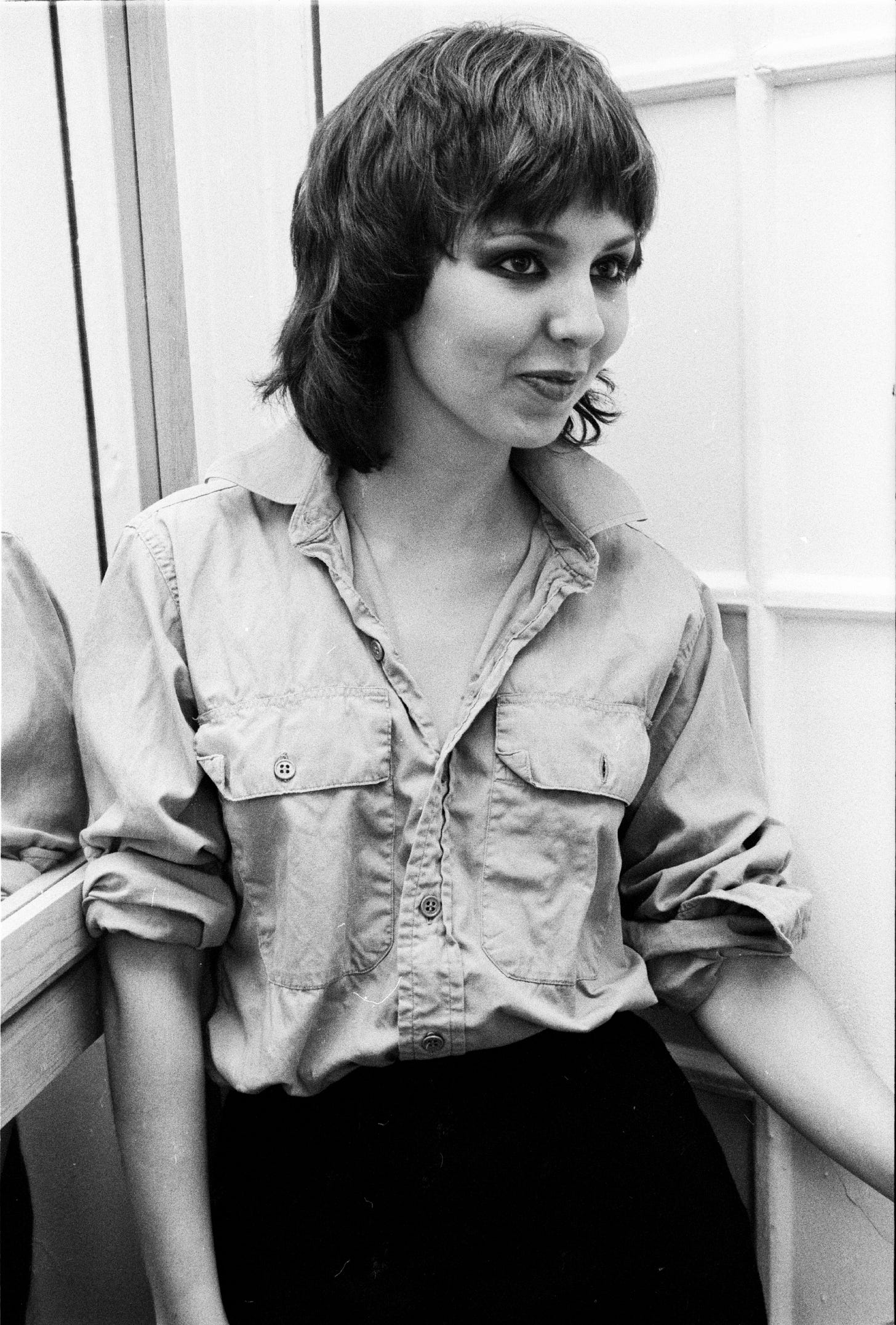
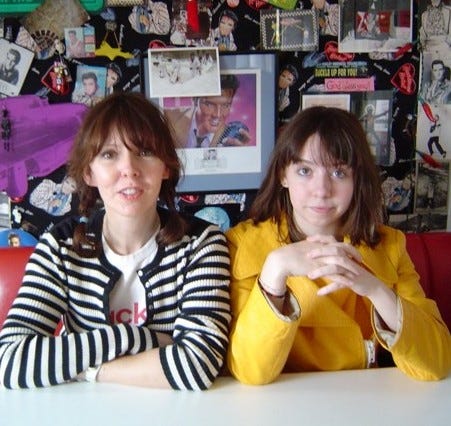
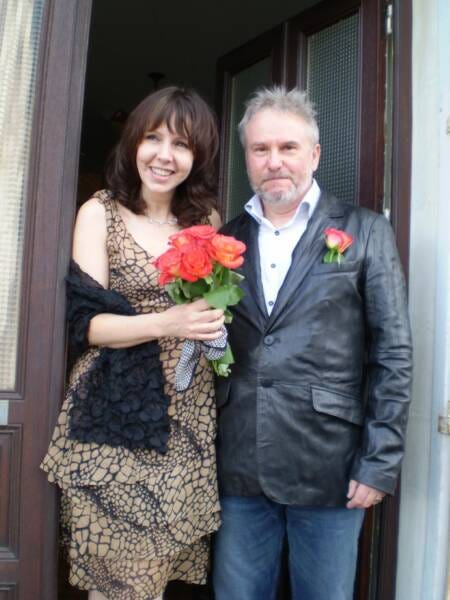
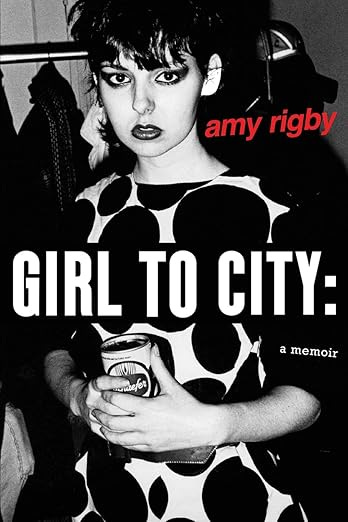
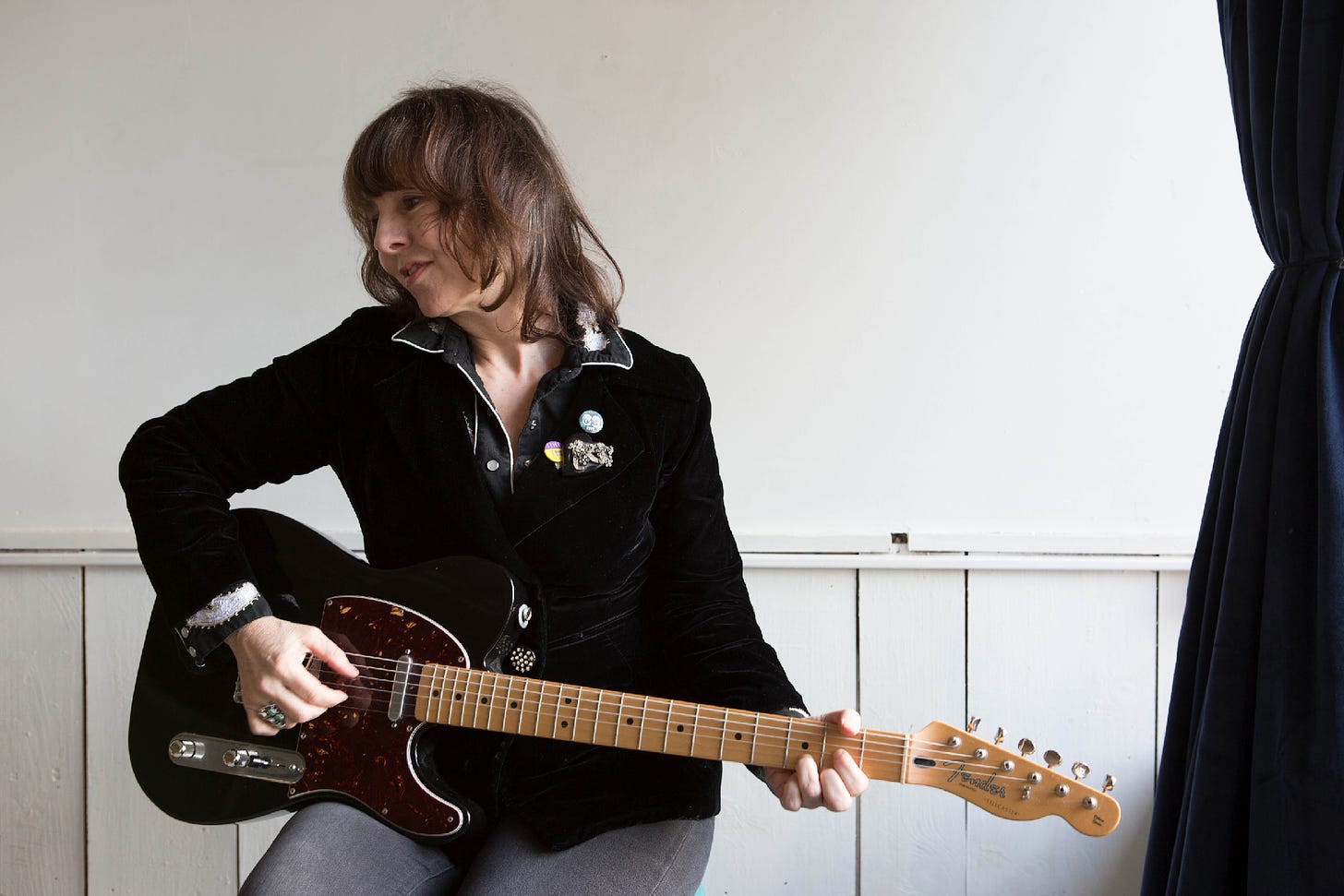
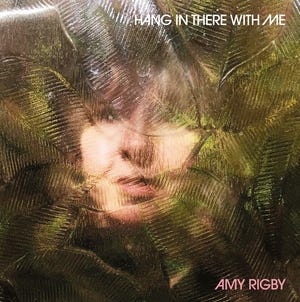
I'm not very kind about my first husband, but he did introduce me to the music that's most important to me, including Amy Rigby. We lived "Beer and Kisses," and our little couch potato is 33. Love this interview! Buying memoir now!
This is wonderful - one of the best in a series of insightful responses. I admire Amy Rigby as a songwriter and an author. As I inch toward 60, I find that a lot of the age-related insecurities I had are fading. I’m a little too lost in nostalgia at the moment, but I see it as taking stock of where I’ve been and how I want to spend my remaining days. It’ll pass.